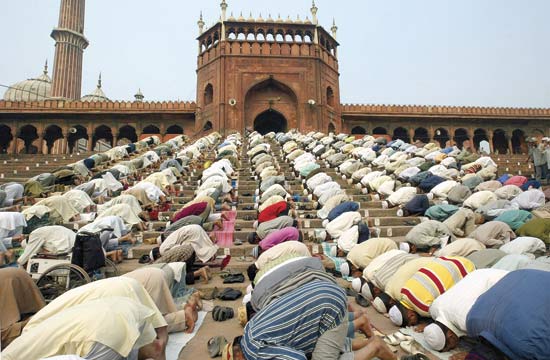Dar al- Iftaa announced that there is no specific phrasing for the takbir for Eid prayers

Dar Al-Ifta` Al-Misriyyah stressed that nothing specific concerning the phrasing of takbir was mentioned in the purified sunnah. However, some of the Companions such as Salman al-Farsi used to make the takbir saying:
Allahu akbar, Allahu akbar, Allahu akbar. La ilaha illa Allah. Allahu akbar, Allahu akbar, wa lillahi al-hamd (Allah is the greatest, Allah is the greatest, Allah is the greatest. There is no god save Allah. Allah is the greatest, Allah is the greatest, praise be to Allah).
The fatwa added that the order to do this is broad and that since long ago Egyptians have used the well-known takbir phrasing of:
Allahu akbar, Allahu akbar, Allahu akbar. La ilaha illa Allah. Allahu akbar, Allahu akbar, wa lillahi al-hamd. Allahu akbar kabiran wal hamdul illah kathiran wa subhana Allahu bukratan wa asilan. La ilaha illa Allah wahdu. Sadaqa wa'du wa nasarah 'abdu wa a'aza jundu wa hazama al-ahzaba wahdu, la ilaha illa Allah.Wa la na'budu illa iya mukhlisisn lahu al-deen wa law karihu al-kafirun. Allahuma salli 'ala sayiduna Muhammad wa 'ala al sayidduna Muhammad wa 'ala ashaba sayidduna Muhammad wa 'ala ansar sayidduna Muhammad wa 'ala azwaja sayidduna Muhammad wa 'ala dhuriyyat sayidduna Muhammad wa salam tasliman kathiran (Allahu akbar, Allahu akbar, Allahu akbar.
There is no god but Allah. Allahu akbar, Allahu akbar, praise be to Allah. Allah is ever greatest, much praise be to Allah. Glory to Him morning and evening, there is no god but Allah. He fulfilled His promise, gave victory to His slave, strengthened His army, and He alone we worship, being sincere in our religion even though the believers are averse. O Allah! Make your prayers and blessings be upon our master Mohammed, upon the family of our master Mohammed, upon the family of our Master Mohammed, and upon the supporters of our master Mohammed, and upon the wives of our master Mohammed and upon the descendants of our master Mohammed, in abundance).
The fatwa maintained that this is a valid legal formulation and Imam al-Shafi'i (may Allah grant him mercy) commented upon it saying, "If a person says Allahu akbar as people do nowadays, it is a good thing. If he adds more takbirs then it is also good. Any remembrance of Allah he adds I deem good." The fatwa confirmed that anyone who claims that the person using this well-known phrasing is an innovator is the one closer to innovation since he has restricted what God and His Messenger have left unrestricted without having evidence to do so. We embrace what our good ancestors deemed good and what the people have accepted and became accustomed to when it agrees with our noble Shari'ah. Their prohibition of such phrasings is incorrect, deserves no attention, and is unreliable.
The fatwa also maintained that the ‘eid prayer is a confirmed sunna and that the Prophet (peace and blessings be upon him) ordered both men and women to attend it. It is permissible to perform it the mosque though it is preferable to hold it in an open space if possible in the absence of any hardship such as cold or rain because this is a sunna from the Prophet. Apart from all the other mosques, Al-Masjid Al-Haram is the only mosque where it is preferable to hold the ‘eid prayer according to the unanimous opinion of scholars.
 Arabic
Arabic French
French Deutsch
Deutsch Urdu
Urdu Pashto
Pashto Swahili
Swahili Hausa
Hausa
